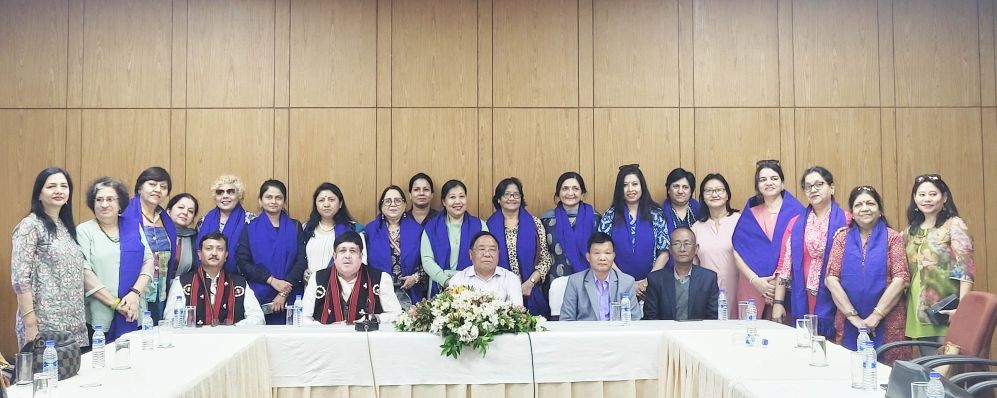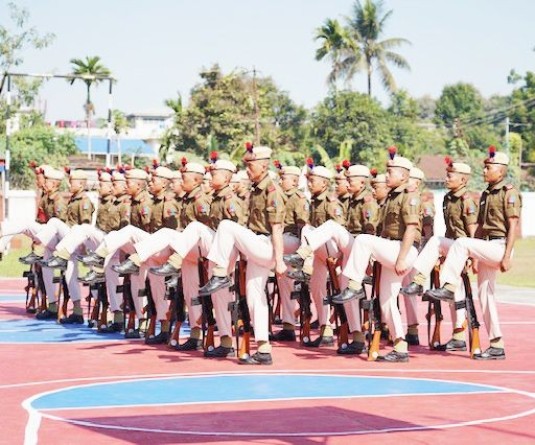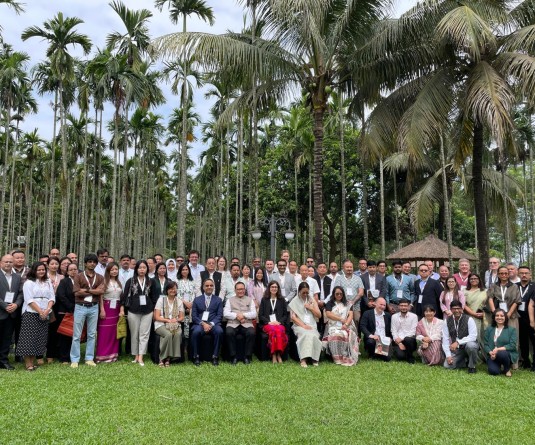NCUI President Dileep Sanghani, Minister Kaito and others in Kohima on March 10. (Morung Photo)

Our Correspondent
Kohima | March 10
The National Cooperative Union of India (NCUI) officials led by its president Dileep Sanghani are currently on two-day visit to Nagaland to oversee the spectrum of cooperative movement in Nagaland.
In a reception programme held here at Hotel Japfü, Sanghani acknowledged the strength of cooperative movement in Nagaland. He stressed on the need to create enabling environment so that cooperatives grow all over the country.
Sanghani informed that process is on for formulating new Cooperative Societies policy in the country. He also called for promotion of market linkages and strengthening capacity building.
Nagaland Agriculture and Cooperation Minister, G Kaito Aye made a fervent plea to NCUI to put all efforts to strengthen cooperative movement in the state. He maintained that Nagaland with its rich natural resources, agricultural activities and community participation in socio-economic development depicts a bright prospect of cooperative movement in Nagaland. He informed that the cooperation department in Nagaland has been insisting the principle of “One Village One Cooperative Societies.”
In Kohima, the NCUI officials visited 2nd World War Cemetery and later toured Khonoma and Mezoma village before their departure to Dimapur.
‘Revitalizing and upscalling cooperative movement in Nagaland’
The state’s department of Cooperation has submitted a gist of note entitled “Revitalizing and upscalling cooperative movement in Nagaland” to NCUI during the reception programme in Kohima.
It stated that the introduction of cooperatives in Nagaland has been relatively late compared to other cooperative societies in other parts of the country; therefore the progress of cooperation movement and cooperative societies in particular is far behind the cooperative movement of the country.
It stated that cooperatives offer enormous opportunities and can effectively address to the task of socio economic development of the North East region in general and Nagaland in particular.
“Therefore, the cooperatives need to be revived and developed as a tangible means for total revamping of the socio economic system in the region,” it stated.
However the absence of cooperative leadership, lack of cooperative education, lack of technical knowhow and training among the cooperative personal, lack of awareness among the people about cooperatives, cooperation and advantages of the cooperative system etc. has led to low membership and poor participation, low business level and inadequate resource base.
“These factors over the years have led to stunted growth of the cooperative movement and cooperative structure Nagaland. In spite of decades of cooperation and cooperative development in the state, the actual spirit of cooperation based on its renewed thrust is yet to be established,” it stated.
Way forward for revitalizing cooperatives in Nagaland
The department stated that the challenge is to mentor people on how the co-operative model functions within different contexts and how it can contribute to meeting economic and social needs. The biggest challenge is to attract communities to work together based on Cooperative principles and values.
Cooperative education and training need to be intensified and extended to rural areas to revive and strengthen the grass root societies, motivate society members and build capacities. These can have more equitable and widespread participation and outreach, it stated.
The state’s cooperation department called for up scaling the capacities of Cooperative Training Institute, Medziphema for higher level of cooperative education and training, expand and diversify cooperative education and training modules, extend training into districts and villages to reach out to the grassroots, strengthening and building capacities of cooperative societies, socio- developmental activities, increasing functional literacy/adult education, better living conditions health care, family welfare, drinking water facilities.
NSCU Dimapur seeks financial assistance
Meanwhile, Nagaland State Cooperative Union (NSCU) Dimapur sought financial assistance for the state cooperative education and training in the state.
It informed that NSCU Dimapur is an Apex Level Non-Trading Cooperative Institution established under the sponsorship of the State Cooperative Department in the year 1967. During the early days when NSCU was fully sponsored by the state government, the Union could take up required Cooperative Education Trainings and provide the latest information on advanced technologies of modern farming methods by conducting educational tours to the farmers to the cooperatively developed states for spot learning and experience to the cooperators.
However, after the mass retirement of NSCU employees under Voluntary Retirement Scheme (VRS) the NSCU had become a mere skeletal, it stated.
The Union informed that the grant-in-aid provided by the department is not enough even to cover the salary expenses of the staff, leaving aside imparting cooperative education and training. “Due to the absence of conducting regular education and training, the cooperative movement remains a non-starter in the state. Besides, the continuous education and training will give awareness to the cooperative to utilize the human resources in a better way and create regular employment and income generation among the people of the state,” it stated.
In this, NSCU President Kedoutsolhi Wetsah and NSCU Chief Executive Officer, Imnanukshi requested NCUI to consider the case and take up the matter for financial assistance.






